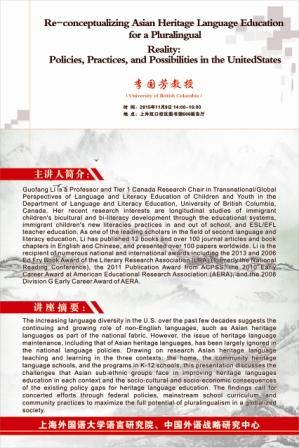|
|

|
历史信息存档
|
Re-conceptualizing Asian Heritage Language Education for a PluralingualRe-conceptualizing Asian Heritage Language Education for a Pluralingual Reality: Policies, Practices, and Possibilities in the United States
主讲人:李国芳教授(University of British Columbia) 时间:2015年11月9日 14:00 – 16:00 地点:上外虹口校区图书馆606报告厅 主办单位:上海外国语大学语言研究院、中国外语战略研究中心 主讲人简介: Guofang Li is a Professor and Tier 1 Canada Research Chair in Transnational/Global Perspectives of Language and Literacy Education of Children and Youth in the Department of Language and Literacy Education, University of British Columbia, Canada. Her recent research interests are longitudinal studies of immigrant children’s bicultural and bi-literacy development through the educational systems, immigrant children’s new literacies practices in and out of school, and ESL/EFL teacher education. As one of the leading scholars in the field of second language and literacy education, Li has published 12 books and over 100 journal articles and book chapters in English and Chinese, and presented over 100 papers worldwide. Li is the recipient of numerous national and international awards including the 2013 and 2006 Ed Fry Book Award of the Literary Research Association (LRA) (formerly the National Reading Conference), the 2011 Publication Award from ACPSS, the 2010 Early Career Award at American Educational Research Association (AERA), and the 2008 Division G Early Career Award of AERA. 讲座摘要: The increasing language diversity in the U.S. over the past few decades suggests the continuing and growing role of non-English languages, such as Asian heritage languages as part of the national fabric. However, the issue of heritage language maintenance, including that of Asian heritage languages, has been largely ignored in the national language policies. Drawing on research Asian heritage language teaching and learning in the three contexts: the home, the community heritage language schools, and the programs in K-12 schools, this presentation discusses the challenges that Asian sub-ethnic groups face in improving heritage languages education in each context and the socio-cultural and socio-economic consequences of the existing policy gaps for heritage language education. The findings call for concerted efforts through federal policies, mainstream school curriculum, and community practices to maximize the full potential of pluralingualism in a globalized society.
|
